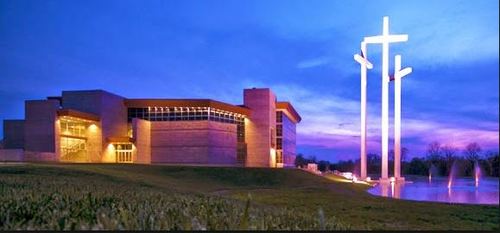“For this reason I left you in Crete, that you would set in order what remains and appoint elders in every city as I directed you.” Titus 1:5
I am a student at a Southern Baptist seminary that is located hundreds of miles from the city in which I reside. Thankfully, distance learning options are available to me. In addition to taking online classes, I take classes at my seminary’s satellite campus at Johnson Ferry Baptist Church in Marietta, Georgia. The Marietta campus is one of several satellite campuses that my seminary operates. My school has campuses in Birmingham, Orlando, and even inside of a state penitentiary. I (along with other distance learning students) can take almost every class I need to graduate at my satellite campus. At that campus there is educational space, administrative staff, and a staff of local professors. There is also audio video equipment which allows professors from the main campus to deliver interactive lectures from the main campus. Everyone at the satellite campus is under the authority of the seminary president just as if we were at the main campus. The situation at my seminary is hardly unique in academia. Satellite campuses at universities are becoming more and more popular. It can be very strange to see the names of various satellite campuses as they pop up in various cities. Universities, like churches, have long been associated with places. Now, as education delivery systems and technology are improving, schools are expanding into different territories. So, a school historically based in Atlanta may open up a satellite campus and make it possible, for example, to reach the students miles away in Macon or even out of state. There is nothing inherently wrong with a school extending its reach in this way, especially if it can offer the same quality of education as it does so. The movement among universities to create satellite campuses is an outworking of the modernization, or what author Thomas Friedman would call “flattening”, of the world. Following the trend of universities, many churches are beginning to open up satellite campuses. While the bible is silent about the proper operation of universities, it does provide the standards by which churches should operate. Unlike the case of university expansion, there is an inherent ecclesiological problem with the creation of church satellite campuses.
The most notable satellite church of which I can think of is North Point Church in Alpharetta, Georgia. It is “pastored” by Andy Stanley, the son of venerable Southern Baptist preacher Charles Stanley, who pastors the First Baptist Church of Atlanta. Andy began his career as the campus pastor of a First Baptist Church of Atlanta satellite campus. Something happened between Andy and his father which led the younger Stanley to found North Point Church. It became huge and eventually started a satellite campus in Buckhead; now it has five satellite campuses in the Atlanta area. Others have followed Stanley’s lead. The Village Church, which was formerly known as Highland Village Baptist Church, is led by popular Baptist preacher Matt Chandler. Like Stanley, Chandler led his church to open up satellite campuses. First Baptist Church of Woodstock, under the leadership of Johnny Hunt, another nationally popular preacher, has opened up multiple campuses as well. One campus is almost 400 miles away from Woodstock, GA in Panama City Beach, Florida (one of Hunt’s favorite vacation spots). Ronnie Floyd, the current President of the Southern Baptist Convention, is the Pastor of Crosschurch in Springdale Arkansas. Under Floyd’s leadership, the church changed its name from First Baptist Church of Springdale and opened four satellite campuses; which are somewhat adjacent to Springdale. With the exception of North Point, all of these churches are Southern Baptist churches; all but Woodstock have intentionally removed the word “Baptist” from the name of the church. They have also, in the tradition of the Roman Catholic Church and in defiance of traditional Baptist church polity, opened up parishes of a mother church. They just call them “satellite campuses” instead of parishes. As very popular mega churches get big, big, and bigger, run out of space in their immediate area, and saturate the local supply of people available for membership, they tend to expand by creating new campuses. The charisma of the pastor, who is often times mainly a preacher, is one of the most important factors in allowing for such expansion. Satellite campuses are built upon a star preacher’s cult of personality moreso than the discipled nature of a local congregation.
There are three words used in the bible to describe the office of the individual or individuals who are charged with the oversight, care, and operation of the local church: episkopos, poimén, and presbuteros. These words are variously translated into overseer, pastor, and elder in English bibles. Baptist theologians have long asserted that, according to New Testament examples, local congregations do not answer to external authorities (other than God, of course). In the New Testament, we are provided no examples of churchmen (notwithstanding Apostles) who had authority over congregations in other cities. We simply do not see the creation of satellite campuses. Local churches that are under the authority of mother churches and outside assemblies, such as Catholic, Anglican, and Episcopal Churches, do not comport to the New Testament model. Baptists have affirmed this for years. Before the satellite campus trend, Baptist churches didn’t expand their own empires through Episcopal church polity but rather expanded the kingdom of God by planting new, independent churches. Multi-campus churches essentially create their own little denominations in the process of their expansions.
Once this error is made, despite the best of great commission intentions, the door is wide open for ecclesiological bedlam. Multi-campus pastors such as Steven Furtick, Perry Noble, Mark Driscoll, and Andy Stanley are on the leading edge of man-centered entrepreneurial church-branding. The cult of personality of other multi-campus pastors such as Johnny Hunt, Ronnie Floyd, and Matt Chandler may not be as overt (or as creepy) as that of the former group, yet it is there nonetheless. The evidence of this is in their polity, their brand expansion, their rejection of sound Baptist ecclesiology. Satellite ecclesiology is an accident waiting to happen. Church members who don’t even know their own pastors are less likely to be doctrinally grounded or biblically discipled than those that do. Such church members are not in the care of any sort of biblical pastor but rather a “campus pastor” in the employ of a self-styled CEO preacher who lives in another town. When I hear “campus pastor” I don’t hear “poimén,” I hear “misthōtos” (which is translated into English as “hireling”). When I hear “multi-campus,” I don’t hear “Baptist,” I hear “brand.”
What we have in the satellite church phenomenon are mega preachers with their mega teaching and their mega bucks in their mega building with their mega authority. They franchise out their own church models like Sonic Drive-In franchises hot dogs and milkshakes. I realize that global globalization is inevitable and that it has arguably helped the world economy. I also realize that Christians must apply scriptures written to ancient people to their modern lives. In the first century it wasn’t possible to pipe the most popular preachers into multiple churches via satellite or the internet. Shooting Andy Stanley via hologram from Alpharetta to Buckhead would have been unimaginable. It simply wasn’t possible to broadcast the best preacher to multiple locations. That wasn’t done and it couldn’t be done; now it can be. The problem with satellite churches, though, isn’t communication media, it’s authority. Even in the 1st century authority could extend from one city to another. It did with emperors and kings. It did not do so with pastors. It should not now do so.
Extending authority is a great way for entrepreneurial pastors to extend their brand, sell their books, and promote themselves. This is not what church is about in scripture. The satellite expansion model is very businesslike; it’s a form of competition. Did First Baptist Woodstock, for example, need to go buy a church building in Panama City and start piping in its sermons there? Weren’t there already numerous Baptist churches in that area? Imagine a hardware store owner in Atlanta with expertise in that industry who discovered that a similar store in Panama City was going out of business. That owner might go down there and buy the Panama City store out of bankruptcy on the cheap and open up another location of his own brand to compete with the other hardware stores in Panama City. He would set up a foothold in that marketplace; same hardware, new customers, same hardware, new revenue streams. The other hardware stores in Panama City would have to fight to retain their market share from the new competitor. Why did First Baptist Woodstock feel the need to open up a campus in Panama City Beach when there are already a blue million Baptist churches in that area? Was no one preaching the gospel down there? Did the local Christians have nowhere to gather and worship? The same questions could be asked of any rapidly expanding mega church. What exactly is being expanded? Often the answer is clear, “the brand.”

What happens to small town grocery stores and hardware stores when Wal-Mart comes to town? They can’t compete. They go out of business. What happens to small churches when mega churches (of the same denomination) came to down? Can small-time preachers compete with the megabranding and charismania of the best preachers in the country? (When is the last time Matt Chandler opened up a campus next to Johnny Hunt?). Satellite mega churches are like Wal-Mart. Wal-Mart is great if you are a price-conscious consumer looking for low-price groceries and cleaning products. Wal-Martesque church isn’t great if you are a Christian looking for a church home. Churches aren’t businesses; at least they aren’t supposed to be. However, franchised businesses are exactly what multi-campus satellite churches emulate. Offending megachurches saturate their local market, move into others, and gobble up revenue streams there, never giving away any authority, only getting more. They don’t multiply, they expand.
If you’re a member of a multi-campus church, it’s time to ask yourself if your church is in the right. It’s time to fix your ecclesiology. It’s time to ask yourself if you are consumer or a church member. It’s time to open your bible and make sure you’re getting things right. As a doctrine, ecclesiology is often ignored. Many Christians may not even be familiar with the word. It’s time to get familiar it. It’s time to recover the satellites.
[Contributed by Seth Dunn]
*Please note that the preceding is my personal opinion. It is not necessarily the opinion of any entity by which I am employed, any church at which I am a member, any church which I attend, or the educational institution at which I am enrolled. Any copyrighted material displayed or referenced is done under the doctrine of fair use.















